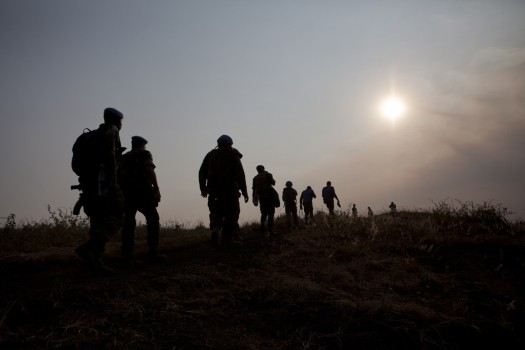A new amnesty law passed by the government in the Democratic Republic of the Congo (DRC) will grant amnesty to hundreds of members of armed groups engaged in hostilities, including members of the infamous M23 rebels.
The decision resulted from peace negotiations between the M23 and the government, which began late last year after the armed group surrendered to the Congolese military.
The Kampala Dialogue set the terms of the amnesty, which pardon acts of insurrection, war, and political offenses on the condition that eligible individuals submit a written commitment to refrain from committing these acts.
| Importantly, however, the amnesty law expressly excludes amnesty for perpetrators of more serious crimes such as genocide, crimes against humanity, war crimes, sexual violence, torture, or child conscription. It only provides amnesty for perpetrators of war related acts that are respecting the laws and customs of war. |
|
Additionally, the law will not disrupt civil proceedings or reparations related to the crimes committed and covered by the law.
Acts of insurrection, also covered by the amnesty law, are confined to acts of collective violence to rebel against authority to express a claim or discontent. Pardons for political offenses are restricted to acts against public authorities, illegal management acts or territory administration with a political aim, as well as writings, images, and statements inciting rebellion against public authority.
“ICTJ joins Congolese civil society and international human rights groups in welcoming the decision to limit the amnesty to lower-level crimes,” said Sofia Candeias, ICTJ Criminal Justice Senior Associate. “However, without equal attention to the prosecution of serious crimes, the amnesty will only serve to formalize persistent and widespread impunity for crimes committed during conflict.”
The United Nations has hailed the law as a demonstration of the DRC’s commitment to implement the Nairobi Declaration, the agreement which formally brought to an end the M23 rebellion, and noted that the law falls within the framework of the Peace, Security and Cooperation Framework for the DRC and the region (PSCF).
“By restricting the new amnesty law to a limited set of offenses, the DRC sends a clear signal that it recognizes its obligations under international law that serious crimes cannot be pardoned,” explained ICTJ Deputy Program Director Anna Myriam Roccatello.
“While this law will help facilitate reintegration of former combatants in society, we must not forget that victims of atrocity crimes are still waiting for accountability. DRC’s efforts to secure peace will falter if survivors’ calls for justice are left to the wind.”
A Slow March towards Justice
Between August 1998 and April 2007, about 5.4 million people were killed during successive wars in the DRC. Although a peace agreement was signed in 2002, massive unemployment, land disputes, inter-ethnic tension and the country’s abundant mineral wealth continue to drive conflict throughout the area.
State forces, national and foreign paramilitaries and armies have all targeted civilians and engaged in gross human rights violations, including murder, sexual violence, forced labor and forced displacement, and the recruitment of child soldiers. Aside from a select number of prosecutions—including the conviction by the International Criminal Court of warlord Thomas Lubanga Dyilo—most perpetrators of serious crimes have enjoyed impunity.
|
Last month, the Ministry of Justice and Human Rights in the DRC made public the list of the first beneficiaries of the 2014 amnesty law passed in February by DRC President Kabila. To date, a total of 271 beneficiaries of the law have been announced. Among the list of amnesty recipients is René Abandi, who led the M23 delegation to the talks last year. |
In 2012, the rebel military group March 23 Movement (M23)—who were once part of the nation’s army—staged a rebellion against the DRC government that killed and displaced large numbers of people. After the M23 surrender in 2013, the two parties met for the Kampala Dialogue, resulting in the dissolution of the M23 faction.
Although the DRC ratified the Rome Statute in 2002 and referred crimes for investigation and prosecution to the ICC beginning in 2004, the government has yet to fully implement the ICC Statute into domestic law. A new law passed in April transferred jurisdiction of war crimes, crimes against humanity and genocide from military to civilian courts, but this has yet to be implemented in practice. Moreover, it does not incorporate definitions of international crimes, or provide for victim participation or due process. There is a chance these shortcomings will be addressed if current draft laws on a specialized chambers and the implementation of the Rome Statute are ultimately adopted.
“The Congolese people have seen little action regards to international crimes and other violations excluded from the scope of the 2014 amnesty law,” said Roccatello. “In the same way the government has taken steps to forgive lower-level crimes, we would like to see equally concrete steps for prosecutions of serious crimes to move forward.”
ICTJ continues to engage with government and civil society stakeholders on increasing DRC’s domestic judicial capacity, including the development of the draft law on the specialized mixed chambers, as well as the draft law on the implementation of Rome Statute.
*Photo: MONUSCO Force Commander, Gen. Carlos Alberto dos Santo Cruz and MILOBS team during an observation mission on Munigi Hill as FARDC conduct an attack on M23 rebel positions in Kanyaruchinya near Goma, the 15th of July 2013. (MONUSCO/Sylvain Liechti)*
